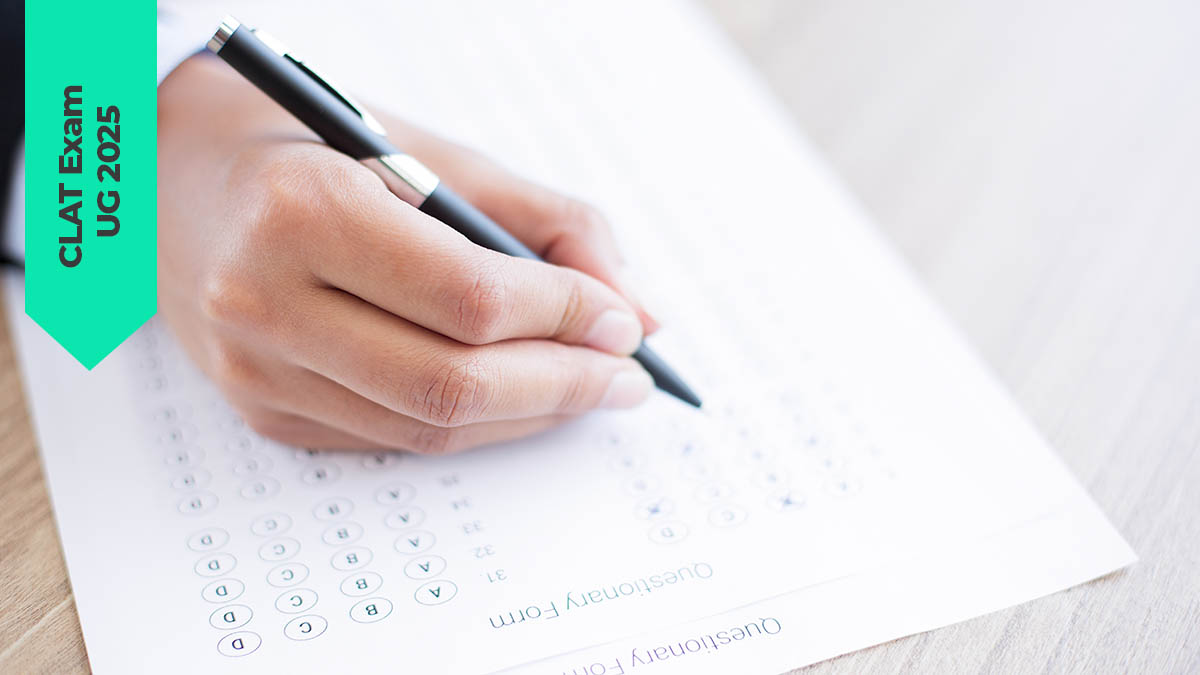Entrance Exam
Cracking CLAT Exam: A Preparation Guide with Tips, Strategies & Resources

The Common Law Admission Test (CLAT) is a national level entrance exam conducted for admission to 22 prestigious National Law Universities across India. Over 50,000 law aspirants appear for this highly competitive exam each year.
Securing admission into top NLUs through CLAT requires rigorous preparation across diverse subjects and exemplary time management skills. In this comprehensive guide, we will provide all the information and smart tips you need to ace the CLAT exam with a high rank.
How to Prepare for CLAT Exam: A Roadmap to Success
As you stand on the threshold of your legal journey, navigating through the Common Law Admission Test (CLAT) is a crucial step toward securing admission into prestigious law schools. The path may seem challenging, but with the right strategy, dedication, and focus, you can conquer the CLAT exam.
The CLAT exam serves as the gateway to some of the most esteemed law institutes in India. A strong performance not only opens doors to quality education but also lays the foundation for a rewarding legal career. To secure success in this competitive exam, a well-thought-out preparation plan is imperative. Here is the list top tips on how to prepare for CLAT Exam.
Understanding the CLAT Exam
The journey toward a successful CLAT experience begins with a profound understanding of the exam’s structure and intricacies. Let’s delve into the key aspects that shape the CLAT examination.
- Exam Pattern Demystified
The CLAT exam, renowned as the gateway to esteemed law institutions, is a test of intellectual prowess and analytical skills. Understanding its structure is the first step towards mastering it.
- Objective Nature: CLAT is an objective paper that evaluates your comprehension and reasoning abilities. It’s crucial to approach each question with a strategic mindset.
- Sections Breakdown:
- English: Assessing language proficiency and comprehension skills.
- General Knowledge & Current Affairs: Testing awareness of current events and general knowledge.
- Elementary Mathematics: Evaluating basic mathematical skills.
- Legal Aptitude: Gauging understanding and interest in legal concepts.
- Logical Reasoning: Measuring analytical and logical reasoning capabilities.
- Question Distribution: The paper comprises a set number of questions from each section. Knowing the distribution helps in planning time efficiently during the exam.
Having a clear comprehension of the exam pattern and syllabus aids in crafting a focused and effective preparation strategy. It sets the foundation for a systematic and targeted approach toward conquering the CLAT examination.
Importance of Knowing the CLAT Syllabus
Understanding the intricacies of the CLAT syllabus is akin to wielding a compass that guides you through the vast terrain of legal education. Let’s delve into why knowing the CLAT syllabus is paramount for your preparation.
- Syllabus Demystified: A Section-wise Exploration
- English Section:
- Syllabus Overview: Comprehension passages, grammar, vocabulary, verbal reasoning, and verbal ability.
- Weightage: Approximately 20-25 questions, contributing 20-25% to the total score.
- Significance: A strong command over the English language is vital for success. Focus on improving reading comprehension and language skills.
- General Knowledge & Current Affairs Section:
- Syllabus Overview: Static general knowledge, current affairs, and events of national and international significance.
- Weightage: The section carries 35-39 questions, accounting for 25-35% of the total score.
- Significance: Staying updated with current events is crucial. Regular reading of newspapers and magazines is recommended.
- Elementary Mathematics Section:
- Syllabus Overview: Mathematics up to Class 10th level, covering topics like profit and loss, percentages, time and work, etc.
- Weightage: 15-20 questions, making up 10-15% of the total score.
- Significance: Focus on building a strong foundation in basic mathematical concepts. Regular practice is key.
- Legal Aptitude Section:
- Syllabus Overview: Study of law, research aptitude, and problem-solving ability.
- Weightage: 35-39 questions, constituting 25-35% of the total score.
- Significance: Understand legal principles, cases, and concepts. Develop the ability to apply legal reasoning.
- Logical Reasoning Section:
- Syllabus Overview: Analytical reasoning, syllogism, logical sequences, analogies, etc.
- Weightage: Approximately 28-32 questions, with a weightage of 20-25%.
- Significance: Sharpen analytical and logical reasoning skills. Practice different types of reasoning problems.
The importance of knowing the CLAT syllabus cannot be overstated. It forms the bedrock of your preparation, guiding you through the diverse terrains of legal knowledge. Armed with this knowledge, you can navigate the CLAT examination with confidence and precision. Read more about CLAT Exam UG 2025: section-wise important topics to focus on for high scores.
Creating an Effective Study Plan
Crafting a study plan is akin to charting a course through the vast sea of knowledge. It is a compass that guides you toward success in the CLAT examination. Let’s delve into the significance of an effective study plan and the key elements that make it a valuable tool for your preparation.
A study plan serves as a roadmap, outlining the journey from preparation to success. It provides a clear direction and purpose to your daily efforts. With a well-structured plan, you can optimize your available time. It ensures that each moment is utilized efficiently, preventing aimless wandering in your study routine.
Breaking Down the Study Plan
- Daily Schedules:
- Allocate Fixed Hours: Set dedicated hours for classes, self-study, revision, and mock tests.
- Prioritize Difficulty Levels: Schedule more hours for challenging topics and relatively less for easier ones.
- Include Breaks: Integrate study breaks to prevent exhaustion and maintain focus.
- Weekly Schedules:
- Subject Rotation: Ensure a mix of topics from all three subjects every day to maintain a balanced approach.
- Consistent Routine: Establish a routine that you can follow diligently throughout the week.
- Monthly Schedules:
- Revision Slots: Allocate specific time slots for periodic revision to reinforce learning.
- Adaptability: Factor in extra classes, tests, and unexpected events to accommodate any deviations from the plan.
Balancing Time Between Subjects
- Subject-wise Allocation:
- Equal Distribution: Balance the time allocated to each subject based on its weightage in the CLAT exam.
- Customization: Customize the distribution based on your proficiency in each subject.
- Importance of Revision:
- Regular Revisions: Allocate dedicated time for revision, ensuring that previously covered topics stay fresh in your memory.
- Strategic Planning: Plan the revision schedule strategically, emphasizing areas that need reinforcement.
Creating an effective study plan is not just a task; it’s a skill that propels you toward success. With a meticulously crafted plan, you can navigate the sea of CLAT preparation with purpose and efficiency. It’s not merely about the quantity of study hours but the quality of your study time that makes the difference. Let your study plan be the guiding star in your journey towards conquering the CLAT examination.
Choosing the Right Study Material for CLAT Exam
Selecting the appropriate study material is akin to assembling the tools for a precise task. In the realm of CLAT preparation, the right resources can significantly elevate your chances of success. Let’s delve into the key aspects of choosing the right study material and enhancing your English proficiency.
- Recommendations for CLAT-Recommended Textbooks
- Introduction to CLAT Textbooks:
- CLAT Syllabus Alignment: Opt for textbooks that align with the CLAT syllabus, covering English, General Knowledge & Current Affairs, Elementary Mathematics, Legal Aptitude, and Logical Reasoning.
- Authoritative Sources: Choose books authored by experts or recommended by CLAT coaching institutes for comprehensive coverage.
- Subject-wise Recommendations:
- English: Wren and Martin for grammar, Word Power Made Easy for vocabulary, and High School English Grammar & Composition by P.C. Wren for detailed language skills.
- General Knowledge & Current Affairs: Manorama Yearbook, Pratiyogita Darpan, and newspapers like The Hindu and The Indian Express.
- Elementary Mathematics: Quantitative Aptitude by R.S. Aggarwal and NCERT Mathematics textbooks for class 9th and 10th.
- Legal Aptitude: Legal Awareness and Legal Reasoning by A.P. Bhardwaj.
- Logical Reasoning: Analytical Reasoning by M.K. Pandey and Verbal and Non-Verbal Reasoning by R.S. Aggarwal.
- Utilizing Online Platforms for Practice and Additional Resources
- Online Practice Platforms:
- CLAT Official Website: Utilize the official CLAT website for practice papers, sample questions, and updates.
- Online Mock Tests: Access various online platforms offering CLAT mock tests to simulate exam conditions and assess your preparedness.
- Supplemental Online Resources:
- Video Tutorials: Explore online platforms providing video tutorials for complex topics, enhancing your understanding.
- Discussion Forums: Engage in CLAT preparation forums to share insights, clear doubts, and stay motivated.
Choosing the right study material is akin to assembling a toolbox for success. The right resources act as guides, illuminating the path to proficiency. Explore more about 10 must read books to ace clat preparation: the ultimate guide.
CLAT Exam – Improving English Proficiency
Enhance your English skills not just for the CLAT exam but for a lifetime of effective communication and understanding.
- Reading Comprehension Skills:
- Diversify Reading Materials: Practice reading diverse materials such as newspapers, novels, and magazines to enhance comprehension skills.
- Regular Practice: Allocate dedicated time for reading comprehension passages regularly.
- Building Vocabulary:
- Word Lists and Dictionary Usage: Create word lists from your readings and use a dictionary to understand meanings.
- Contextual Vocabulary: Learn words in context, understanding their usage in sentences.
- Grammar and Sentence Structuring:
- Grammar Skill Development: Work on grammar skills by solving exercises from reputable grammar books.
- Sentence Construction: Practice constructing grammatically correct sentences to improve writing proficiency.
- Holistic Language Enhancement:
- Reading Aloud: Read passages aloud to improve pronunciation and fluency.
- Engage in Conversations: Engage in discussions with peers to enhance verbal communication skills.
The journey towards success begins with the right tools – choose wisely and thrive in your CLAT preparation.
Stay Updated with Current Affairs – Importance of Newspapers and Magazines for Current Affairs
- Stay Updated with Current Affairs:
- Daily Reading Habits: Cultivate a habit of reading newspapers like The Hindu, The Indian Express, and magazines like Pratiyogita Darpan to stay abreast of current affairs.
- Editorials and Opinions: Focus on editorials and opinion pieces to enhance critical thinking and analytical skills.
- Note-taking for Revision:
- Maintain a Journal: Keep a journal to jot down important events, dates, and facts for quick revision.
- Create Mind Maps: Use mind maps to connect related topics, aiding in better retention.
How to Study CLAT Exam: Nurturing Logical Reasoning Skills for Success
Mastering logical reasoning is not just a requisite for exams; it’s a skill that shapes your ability to think critically and solve problems effectively. Here’s a concise guide for students on enhancing logical reasoning skills.
- Critical Thinking Unleashed
- Test of Abilities: Recognize that logical reasoning assesses your critical thinking and problem-solving prowess.
- Diverse Logical Reasoning Questions
- Varied Practices: Incorporate various types of logical reasoning questions into your practice routine.
- Cultivate Rational Thinking
- Mindful Analysis: Develop the ability to think rationally by carefully analyzing situations and data.
- Practical Tips for Improvement
- Consistent Practice: Regularly practice logical reasoning questions to strengthen your skills.
- Learn from Solutions: Understand the solutions to identify patterns and improve your approach.
- Utilize Educational Apps and Resources
- Interactive Learning: Explore educational apps and online resources that offer interactive logical reasoning exercises.
- Diversify Question Types: Opt for resources that cover a spectrum of logical reasoning question formats.
In the journey of honing your logical reasoning skills, consistency is your ally. By integrating these practices into your study routine, you not only prepare for exams but also cultivate a valuable skill set for life. So, let’s navigate the world of logical reasoning with curiosity and a determination to unravel its intricacies.
Understand Legal Concepts, Terms
Delving into legal studies can be both exciting and challenging. Here’s a concise roadmap for Class 12 students to understand legal concepts without getting lost in jargon.
- Legal Dictionaries as Guides
- Define Your Path: Explore legal dictionaries to comprehend the meanings and definitions of intricate legal terms.
- Grasp the Essence of Constitution
- Constitutional Comprehension: Familiarize yourself with the basics of the Indian Constitution and its pivotal legal provisions.
- Bridging Theory with Practice through Case Studies
- Application Mastery: Elevate your understanding of legal principles by immersing yourself in real-world scenarios through case studies.
- Synthesis of Learning
- Holistic Approach: Combine theoretical knowledge with practical application to reinforce your grasp on legal concepts.
As you navigate the labyrinth of legal studies, remember that each concept holds the key to unraveling the intricacies of the legal landscape. By incorporating these practices into your routine, you not only decode legal terminologies but also cultivate a comprehensive understanding of the subject.
Nurturing Strengths: Tackling Weak Areas in Exam Preparation
In the pursuit of academic excellence, acknowledging and addressing weak areas is a pivotal step. Here’s a brief guide tailored for Class 12 students on how to strategically navigate and strengthen your weaker subjects and topics.
- Self-Assessment Strategies
- Holistic Evaluation: Employ effective self-assessment techniques to pinpoint weaker subjects and specific topics.
- Reflect and Analyze: Regularly reflect on your performance in practice tests to identify areas requiring improvement.
- Strengthening Through Extra Practice
- Dedicated Practice Sessions: Devote additional time to practicing problems and exercises related to weaker subjects.
- Utilize Online Tutorials: Leverage online tutorials and educational platforms to reinforce your understanding through interactive learning.
- Seek Guidance for Sustainable Progress
- Guidance from Mentors: Don’t hesitate to seek guidance from teachers, peers, or mentors to clarify doubts in challenging subjects.
- Balanced Attention: Distribute your focus evenly among all sections, ensuring a comprehensive and balanced approach to your studies.
Remember, addressing weaker areas is not just about catching up; it’s a strategic move towards mastering every facet of your academic journey.
Mastering CLAT: A Prelude to Success through Previous Years’ Papers
Unlock the secrets to CLAT success by delving into the wealth of previous years’ question papers. Here’s a snapshot for Class 12 students on the pivotal role these papers play in your preparation:
- Embracing Familiarity
- Strategic Familiarization: Practice with past CLAT papers to acquaint yourself with the exam pattern and question types.
- Navigating Time Management
- Time Mastery: Previous papers hone your time management skills, ensuring you’re adept at tackling the real-time challenges of CLAT.
- Applying Concepts Effectively
- Practical Application: Gain hands-on experience in applying legal concepts, critical for excelling in the CLAT examination.
- Learn, Adapt, and Improve
- Analyzing Mistakes: Use each attempt as a learning curve, analyzing mistakes to foster continuous improvement in your preparation.
Dive into the wealth of CLAT’s past, unravel its patterns, and pave your way to success. Happy practicing!
Mastering CLAT: The Mock Test Advantage
Unlock your potential for CLAT success by embracing the power of regular mock tests. Here’s a quick guide for Class 12 students on why mock tests are your secret weapon:
- Building Exam Temperament
- Simulating Real Conditions: Mock tests create an exam-like environment, preparing you for the challenges of the actual CLAT.
- Tips for Effective Mock Test Sessions
- Strategic Approach: Learn the art of tackling mock tests strategically, optimizing your performance and time management.
- Refining Preparation Through Analysis
- In-Depth Learning: Dive into comprehensive analysis post-mock tests, identifying strengths and areas for improvement to refine your preparation.
With mock tests, you not only practice; you elevate your game to ace the CLAT. Happy mock testing!
Navigating the Final Lap: Last-Minute CLAT Success
As Class 12 students gear up for the CLAT, mastering last-minute strategies is key to achieving excellence. Here’s a concise guide for those crucial weeks:
- Approaching the Final Weeks
- Strategic Revision: Focus on targeted revision, emphasizing weak areas and reinforcing strong ones.
- Prioritize Relaxation
- Mindful Breaks: Balancing study with relaxation is vital. Incorporate short breaks to recharge your mind.
- Stay Focused with Mock Tests
- Mock Tests as Assessments: Leverage mock tests for last-minute evaluation, ensuring you’re exam-ready.
Embrace these strategies, stay calm, and trust your preparation. You’re on the brink of CLAT success! Best of luck!
Acing the CLAT: Mastering Exam Day
As the CLAT day inches closer, having a well-thought-out strategy can make all the difference. Here’s a guide to ensure you perform at your best:
- The Day Before: A Checklist
- Document Check: Ensure you have all necessary documents—admit card, ID, etc.
- Venue Visit: Familiarize yourself with the exam center’s location and layout.
- Relaxation Techniques: Engage in calming activities to ease pre-exam jitters.
- Navigating the Exam Hall
- Time Management: Allocate time for each section to ensure completion.
- Stress Management: Practice deep breathing to stay calm during challenging moments.
- Positive Mindset: Approach each question with confidence, focusing on your preparation.
- Optimizing Performance
- Prioritize Sections: Tackle sections you’re most confident in first to build momentum.
- Flagging Strategy: Mark questions to revisit later, preventing time wastage on challenging ones.
- Time Checks: Regularly assess your pace to ensure you’re on track.
Remember, you’ve put in the hard work—now it’s time to shine. Stay composed, trust your abilities, and approach the CLAT with a winning mindset.
Navigating the Aftermath: Your Post-CLAT Guide
Congratulations on completing the CLAT! As you exhale after the exam, it’s essential to handle the aftermath strategically. Here’s a roadmap for the post-exam phase:
- Post-Exam Etiquette
- Avoid Over-analysis: Refrain from scrutinizing the paper or discussing answers extensively.
- Respect Others’ Experiences: Recognize that perceptions of difficulty vary; respect diverse opinions.
- Maintain Composure: Stay calm and composed, irrespective of how you feel about the exam.
- Coping with Stress and Anticipation
- Engage in Relaxation Techniques: Practice mindfulness or indulge in activities that bring joy.
- Distract Yourself Positively: Shift focus to hobbies or activities to prevent constant post-exam reflection.
- Avoid Score Speculation: Resist the urge to predict your scores, as it only adds unnecessary stress.
- The Importance of Self-Care
- Physical Well-being: Ensure you get ample rest, eat healthily, and stay hydrated.
- Mental Well-being: Embrace activities that soothe your mind—be it reading, listening to music, or spending time with loved ones.
- Reflect Positively: Acknowledge your efforts, irrespective of the exam outcome.
Remember, the post-exam period is a crucial phase of your journey. By adopting a positive and mindful approach, you set the stage for a smoother transition into the awaiting results. Take a deep breath, you’ve earned it!
Crafting Success: Preparation for CLAT Exam with Confidence
As we conclude this journey through CLAT preparation, let’s encapsulate the essence of a successful approach:
Advocating a Balanced Approach
- Prioritize Self-Care: A healthy body and mind are invaluable assets during preparation.
- Post-Exam Reflection: Navigate the aftermath with grace, maintaining composure and focusing on well-being.
- Positive Mindset: Embrace challenges with a positive attitude, understanding that the journey is as crucial as the destination.
The Road Ahead
As you tread the path towards CLAT, remember that success is not solely defined by the destination but by the journey itself. Your consistent efforts, strategic planning, and balanced approach will undoubtedly pave the way for a remarkable CLAT experience. So, march forward with confidence, for you are not just preparing for an exam; you are crafting a successful and resilient future in the legal realm. Best of luck!
Entrance Exam
10 Must Read Books to Ace CLAT Preparation: The Ultimate Guide

Cracking the Common Law Admission Test (CLAT) requires diligent preparation and extensive practice across diverse subjects. Along with coaching classes and online resources, referring to the right books for CLAT exam forms an indispensable part of one’s preparation strategy.
What is CLAT Exam?
The Common Law Admission Test, popularly known as CLAT, is a centralised national level entrance exam conducted for admissions to undergraduate and postgraduate law programmes offered by 22 National Law Universities in India.
The CLAT exam aims to test the aptitude, reasoning and comprehension abilities of law aspirants seeking admission to the participating universities. It evaluates students on crucial cognitive skills required for studying law.
CLAT scores are accepted by over 70 colleges affiliated with National Law Universities. It is one of the most popular law entrance exams with over 50,000 students appearing across the country each year.
The exam pattern comprises of 5 sections – English Language, Current Affairs & GK, Quantitative Techniques, Logical Reasoning and Legal Aptitude. 150 objective type questions have to be solved in 2 hours. Negative marking of 0.25 is applicable for incorrect answers.
Through a standardized and robust evaluation pattern, CLAT ensures admission of well-rounded law aspirants having analytical reasoning skills and aptitude for the challenging legal education ahead.
Why is CLAT Exam Important?
The Common Law Admission Test, popularly known as CLAT, is considered one of the most prestigious law entrance exams in India. Here are some reasons that make clearing CLAT important:
- It is the gateway to getting admission in 22 elite National Law Universities across the country including NLSIU Bangalore, NALSAR Hyderabad, NUJS Kolkata etc.
- Excellent placements and average salaries offered to students of these renowned NLUs after graduation.
- CLAT is accepted by over 70 law institutions, colleges and universities for admission.
- Excellent options for higher studies after completing 5 year BA LLB program like LLM, MBA, Civil Services, Judiciary etc.
- Opportunity to build a thriving career in diverse law fields like corporate law, criminal law, patent law, academia etc.
In short, CLAT opens doors to prestigious institutions, builds core skills and provides a proven path to have a rewarding career as a lawyer. This makes it one of the most important exams for law aspirants in the country.
10 Must Read Books to Ace CLAT Exam Preparation
Books lend structure to your CLAT study plan. They not only provide in-depth coverage of the vast syllabus but also allow you to take timed mock tests to assess your progress. In this article, we bring you a curated list of 10 best books for CLAT exam 2024 for your exam preparation.
- Word Power Made Easy by Norman Lewis
Building a strong vocabulary is essential for maximizing scores in the English section of CLAT. ‘Word Power Made Easy’ by Norman Lewis is the holy grail for learning new words effortlessly. The book contains 2000+ vocabulary words along with memory tips and regular revision exercises. The words are arranged by chapters like words used in examinations, personality development, business communication etc., making it student-friendly. Solving crosswords and quizzes at the end of every chapter reinforces the new words learnt. This book lays a robust foundation for vocabulary enhancement for CLAT and other competitive exams.
- Objective General English by R.S. Aggarwal
R.S Aggarwal’s book is a one-stop solution for honing your English grammar skills as per CLAT requirements. It covers all aspects like tenses, clauses, conditionals, prepositions, verbs, punctuation etc. in great detail. Each topic starts with basic concepts followed by well-designed objective questions for practice. A chapter on Comprehension specifically prepares you to tackle RC passages in exams. Model test papers help assess your overall learning. Highly recommended for mastering grammar effectively and filling all conceptual gaps.
- Legal Aptitude and Legal Reasoning by RS Agarwal
The Legal Aptitude and Legal Reasoning book by RS Agarwal presents a lucid approach to grasp key legal concepts relevant for CLAT. It covers Indian Constitution, Civil law and Criminal law acts and provisions in a reader-friendly manner. Sample scenarios and cases are used to explain legal principles and their applicability. Gradually advancing difficulty levels of questions test your understanding of theory learned. Boost your legal IQ through this book and get exam ready.
- Analytical Reasoning by M.K. Pandey
Strengthening your analytical reasoning skills is vital for securing high scores in CLAT. M.K. Pandey’s book provides well-structured content and practice exercises on the topic. Basic aspects like notations, propositions, syllogism, blood relations etc. have been elaborately discussed first. Advance concepts like machine input, seating arrangements, linear arrangements etc. are also covered. Each chapter has solved examples followed by practice questions. Taking multiple mocks from this book will develop the logical thinking ability necessary for CLAT.
- Quantitative Aptitude for Competitive Examinations by R.S. Aggarwal
R.S. Aggarwal’s Quantitative Aptitude book is highly recommended for mastering the concepts of numbers, algebra, geometry, mensuration and data interpretation. The Quantitative Techniques section of CLAT tests your logical aptitude and basic math proficiency. The book provides step-by-step methods to solve various quant problems accurately. Regular practice of the objective questions given after each topic will help improve calculation speed and efficiency. One of the best books for quantitative aptitude preparation for CLAT.
- Lucent’s General Knowledge by Piyush Kumar Vyas
Lucent’s GK book delivers updated content across history, politics, economy, science and other topics relevant for the Current Affairs section of CLAT. The book spans over 700 pages covering both static and current general knowledge comprehensively. Important facts have been presented in Q&A format for quick revision. Preliminary model test papers help gauge your knowledge. Lucent’s GK book ensures complete conceptual clarity and retention to attempt all 35 GK questions correctly.
- 15 Years’ CLAT Solved Papers by Arihant Experts
Solving previous years’ question papers should be an integral part of your test preparation. Arihant’s CLAT Solved Papers book provides fully solved question papers from 2008 to 2022. Solutions have been explained in a lucid manner for better understanding. 15 year-wise papers give insights on the changing exam patterns and weightage of topics over the years. The book will help you get familiar with CLAT questions types and difficulty levels.
- The Pearson Guide to CLAT by Pearson
This guide book by Pearson for CLAT preparation covers the entire syllabus in a comprehensive, well-organized manner. The concepts and self-assessment exercises will test your understanding across – English, GK, Logical Reasoning, Mathematics and Legal Aptitude. Section-wise tips are also provided to crack each section smartly. The guide has previous years’ solved papers as well for robust practice. Highly recommended as a single point reference book for concept clarity and scoring high in CLAT.
- Universal’s CLAT Guide by Universal Law Publishing
Universal’s guide is an exhaustive book for CLAT preparation covering over 1800 pages. It provides in-depth coverage and analysis of the full syllabus including section-wise tips and tricks. The book has fully solved questions from 18 years’ previous papers. Chapter-wise Mock Tests with solutions help evaluate performance across topics and build exam temperament. This all-inclusive book is excellent for strengthening conceptual knowledge and exam strategy.
- LexisNexis CLAT Study Notes
Published by Lexis Nexis, these CLAT Study Notes provide concise theory explanation along with sufficient practice questions. The content has been prepared by experts after thorough research on CLAT exam pattern. The book covers all 5 sections with Tips & Techniques to master each. Previous years’ solved papers and model test papers included help test your exam readiness. Highly recommended for quick revision on the go.
Choosing the Right Books for CLAT 2024
With a vast syllabus and challenging exam pattern, picking the right books is crucial for CLAT preparation. Here are some key criteria for selecting books:
- Ensure books cover the latest CLAT exam pattern and syllabus.
- Check if they provide sufficient practice questions, mock tests for exam preparation.
- Books should have in-depth coverage of core concepts across all 5 sections.
- They should act as good supplement to your coaching classes and notes.
- Choose books from reputed coaching institutes and publishers.
- Refer to recommendations from CLAT toppers and experts.
- Opt for concise books for quick revision on the go.
- Pick previous years’ solved question banks for practice.
- Select books suited for your learning needs and level of proficiency.
Choosing books carefully based on these parameters will give you the preparation edge for acing CLAT 2024.
Recommended Books for CLAT UG 2024 Section-wise
English: Word Power Made Easy by Norman Lewis, Objective General English by R.S Aggarwal
Current Affairs & GK: Lucent’s General Knowledge by Piyush Kumar Vyas, General Awareness 2019 by Manohar Pandey
Logical Reasoning: Analytical Reasoning by M.K. Pandey, Verbal & Non-Verbal Reasoning by R.S. Aggarwal
Quantitative Techniques: Quantitative Aptitude by R.S. Aggarwal, Fast Track Objective Arithmetic by Rajesh Verma
Legal Aptitude: Legal Aptitude and Legal Reasoning by R.S. Aggarwal, Legal Awareness & Legal Reasoning by AP Bhardwaj
Practice Papers: 15 Years’ Solved Papers for CLAT by Arihant Experts, CLAT 2022 Previous Papers by Disha Experts
Choose books written by experts relevant to the latest exam pattern. Invest in a good book for each section and rigorously practice topics. Explore more about section-wise important topics to focus on for high scores.
Tips to Crack CLAT Exam 2024
- Analyze the exam pattern and syllabus in-depth – Understand the type of questions, topics covered and difficulty level across sections. This will help you prepare accordingly.
- Strengthen your basics – Focus on clearing your fundamentals in English, Logical Reasoning, Elementary Mathematics etc. All questions are set on these core topics.
- Read comprehension passages daily – Practice reading newspapers, magazines, novels etc. to improve reading speed and analytical skills for the English section.
- Never ignore Current Affairs – Stay updated with the latest happenings through newspapers, magazines and news apps. Revise current affairs monthly.
- Solve past exam papers – Solving previous years’ papers will help understand the CLAT exam better. Analyze to find improvement areas.
- Take mocks regularly – Appear for sectional and full length mocks to assess preparation level. Identify weak zones and improve speed and accuracy.
- Avoid any new topics near exam – Only revise formulae, important laws, theorems, rules etc. in the last month before exam.
- Stay calm on the exam day – Don’t stress yourself out on D-day. Revise key notes, have a healthy breakfast and take the test with confidence.
Follow these tips diligently along with your CLAT preparation strategy to maximize your scores.
Takeaway
We have curated this list of must read books after careful research and considering previous years’ CLAT toppers’ recommendations. These books comprehensively cover the CLAT exam syllabus and provide ample practice questions and mock tests. Read them diligently along with attending coaching classes if required. Solve previous papers and take regular mocks in timed conditions. Stay motivated through your preparation journey with these books as your guide. Consistent effort will ensure you ace CLAT 2023 with flying colors. Best of luck!
Entrance Exam
CLAT Exam UG 2025: Section-wise Important Topics to Focus on for High Scores

The Common Law Admission Test exam (CLAT Exam UG) is the golden ticket to getting into the most prestigious National Law Universities in India. With over 50,000 students appearing each year, the competition is steep. This makes it crucial to identify important topics and focus your CLAT preparation accordingly.
In this article, we will do a section-wise analysis of key topics you need to focus on to score high in the CLAT UG 2025 exam. Mastering these units through rigorous practice will help secure your place in a top NLU.
What is CLAT Exam Pattern 2025
The Common Law Admission Test (CLAT) is conducted by the Consortium of National Law Universities in India. The CLAT exam pattern 2025 will be on similar lines as the previous year with a few changes. Let’s analyze the CLAT UG 2025 exam pattern in detail:
Exam Mode and Duration
- CLAT 2025 will be conducted in online mode as an AI-enabled test of 2 hours duration.
- Students can take the exam from home or designated centers if they prefer.
- The exam duration has been reduced by 30 minutes to 2 hours from 2023 onwards.
Sections and Questions
- There will be 5 sections – English Language, Current Affairs & GK, Logical Reasoning, Quantitative Techniques and Legal Aptitude.
- Total number of questions have been reduced to 150 with 30 questions per section instead of earlier 40 questions per section.
- Each section will have objective type multiple choice questions of 1 mark each.
Marking Scheme
- 1 mark is awarded for every correct answer. There is negative marking of 0.25 marks for wrong answers.
- Unattempted questions do not attract any negative marks.
- After 30 questions in each section, remaining extra questions will not be displayed or evaluated.
Syllabus Topics
- The syllabus will majorly cover Class 11th and 12th level topics from the subjects of English, GK, Reasoning, Mathematics and basic Legal concepts.
- English section tests vocabulary, grammar, comprehension and verbal ability.
- GK and Current Affairs will focus on static GK along with latest happenings and events.
- No fixed syllabus but class 12th level quantitative ability expected for Quantitative Techniques.
Difficulty Level
- The paper difficulty level is moderate. Questions are designed to test aptitude and high school level knowledge.
- Legal Aptitude section can be tricky for non-humanities students. Guidance is recommended.
Scoring 150 marks out of the total 150 requires thorough concept clarity and practice of previous papers. Understand the key aspects of the CLAT 2025 exam pattern shared above and prepare accordingly to conquer CLAT!
CLAT Exam 2025 Syllabus and Subject Weightage
The CLAT 2025 syllabus covers questions from 5 sections – English Language, Current Affairs and General Knowledge, Quantitative Techniques, Logical Reasoning and Legal Aptitude. Let’s look at the subject areas and weightage of topics:
English Language Syllabus
- Reading Comprehension – 2 passages with questions testing verbal ability and analytical skills.
- Grammar and Vocabulary Based Questions – Fill in the blanks, phrases, clauses, error identification etc.
- Weightage – Around 40% questions from overall English syllabus.
Current Affairs and General Knowledge Syllabus
- Current Affairs – National and international news, business, science, sports, important days etc.
- Static General Knowledge – History, geography, polity, economy and general science.
- Weightage – Around 25% questions from recent updates and static GK topics.
Logical Reasoning Syllabus
- Analytical reasoning – Puzzles, seating arrangements, grouping and ordering questions.
- Critical thinking – Assumptions, conclusions, inferences and logic based questions.
- Weightage – Around 15% questions requiring logical reasoning and analytical skills.
Quantitative Techniques Syllabus
- Numbers, averages, ratios, percentages, profit-loss, interest, graphs, geometry etc.
- Modern math and advanced problem solving not included. Focus is on basic quant skills.
- Weightage – Around 10% questions of class 10th level mathematics topics.
Legal Aptitude Syllabus
- Indian Constitution, Legal definitions, laws – IPC, CrPC, Contract Law and Tort Law.
- Principles of equity, legal issues, theories and landmark judgments.
- Weightage – Around 10% questions testing basic legal knowledge expected for CLAT.
The syllabus breakdown highlights the topics and sections holding maximum weightage in the exam. Explore most important book for CLAT exam preparation. Prepare smartly according to the syllabus analysis for high CLAT scores!
CLAT UG Exam: Important Topics to Focus on
The Common Law Admission Test undergraduate entrance exam (CLAT UG) is the ticket to getting into the most prestigious National Law Universities in India. With over 50,000 aspirants competing for limited seats, acing CLAT requires meticulous exam preparation and focus on important topics. In this article, we do a section-wise analysis of the high-yield topics you need to concentrate maximum time on for scoring high in CLAT UG 2025.
The CLAT UG exam tests students across five sections – English, General Knowledge, Logical Reasoning, Quantitative Techniques and Legal Aptitude. With just 150 questions now, gaining complete mastery over crucial topics becomes vital for success. We bring you an in-depth look at subject-wise important units that have consistently appeared over the years and proven to be scoring. Keeping these topics at the core of your CLAT exam preparation strategy will provide the edge you need to conquer CLAT 2025. Here are the important topics to focus on for high score in CLAT Exam.
- Critical English Language Topics
English is one of the most scoring sections if you have strong command over the fundamentals. Some must-focus topics include:
- Vocabulary Building – Learn common synonyms, antonyms, analogies and one word substitutes. Refer English word power books to build your repertoire of words.
- Grammar Rules – Brush up tenses, clauses, voices, parts of speech etc. grammar concepts clearly. Learn to spot errors in sentences.
- Reading Comprehension – Practice reading passages daily to improve analytical thinking and reading speed.
- Critical Reasoning – Attempt previous years’ critical reasoning questions. Identify assumptions, conclusions, strengths/weaknesses of arguments.
- Fill in the Blanks – Learn to use contextual clues to fill in the blanks correctly. Build vocabulary and grammar strength for this question type.
Stay thorough with the English syllabus and rigorously practice previous CLAT papers to ace this section.
- Current Affairs & General Knowledge: Crucial Updates to Track
Current Affairs and General Knowledge section requires being updated on the latest happenings. Keep track of the following:
- National News – Government policies, bills, schemes, summit outcomes etc.
- International Affairs – Geopolitics, bilateral ties, global conferences, world organizations.
- Economy – Budget highlights, industrial growth, five year plans progress etc.
- Science & Tech – Latest inventions and innovations, space missions, tech policies.
- Legal News – Important judgments, changes in legal provisions, new laws passed.
- Sports Events – Major tournament highlights, sports personalities in news.
- Create monthly revision notes and take current affairs quizzes to track preparations.
- Vital Areas of Logical Reasoning
This section checks your logical thinking and problem solving abilities. Key areas to focus on are:
- Analytical Reasoning – Give ample practice to Puzzles, Seating arrangements, Blood relations questions.
- Critical Thinking – Train yourself to identify assumptions, conclusions and inferences correctly.
- Syllogisms – Master solving syllogisms through statement analysis and Venn diagrams.
- Statement and Argument Questions – Determine whether statements logically follow arguments or not.
Learn basic tricks to increase speed and accuracy for reasoning questions. Taking sectional mocks will tremendously help score 30+ in this section.
- Legal Aptitude Fundamentals
While advanced legal knowledge is not required, having clarity on basics is a must. Core topics include:
- Indian Constitution – Understand the Preamble, Fundamental Rights and Duties, Directive Principles etc.
- Contract Laws – Learn elements of valid contract, types, discharge of contract and remedies.
- Torts – Familiarize with concepts like nuisance, trespass, defamation, negligence.
- Landmark SC Cases – Know facts, laws, impact of pivotal cases like Kesavananda Bharati, Shah Bano etc.
- Legal Logic – Grasp use of legal phrases and maxims like – doctrine of severability, res ipsa loquitur etc.
- Analyze previous CLAT papers to identify frequently tested legal areas and give them priority.
- Quantitative Aptitude Topics
While the Quantitative Techniques section only holds elementary level math, scoring well requires conceptual clarity. Key topics are:
- Percentages – Thoroughly learn percentage calculations, conversions, profit/loss, SI/CI.
- Averages – Practice arithmetic mean, median, mode for easy and weighted averages.
- Ratios and Proportions – Word problems involving ratios, variation, allegations, mixtures etc.
- Algebra – Factorization of expressions, linear/quadratic equations, exponents/logarithms rules.
- Geometry and Mensuration – Formulae for triangles, circles, cubes, spheres and cylinders.
- Data Interpretation – Comprehend and solve questions based on tables, charts, graphs and caselets.
In the last months, take sectional math quizzes to gain speed and accuracy in solving CLAT level quant problems.
Conclusion
Identifying these high-yield topics and gaining complete mastery over them through regular practice is the most efficient way to ace CLAT UG 2025. Along with revising these concepts thoroughly, also solve previous years’ papers and take ample mock tests. Consistent effort, smart planning and time management will be key. If you have any other queries on CLAT preparation, feel free to ask in the comments. All the best!
Entrance Exam
NEET Preparation Tips – NEET-UG Study Plan and Strategy, Timetable, Notes, Books & Resources to Crack the Exam

The National Eligibility cum Entrance Test (NEET) is one of the most competitive exams in India that students have to clear for admission into MBBS and BDS courses across the country. Over 14 lakh aspirants appear for this exam every year, making it extremely challenging to secure a top rank. Proper planning, effective time management and following smart study practices are crucial to crack NEET in your first attempt. In this comprehensive guide, we will share the most successful NEET exam preparation tips and strategies to help you score high in NEET and realize your dream of studying medicine.
How to Prepare for NEET Exam: A Strategic Approach for Success
Preparing for the NEET exam demands more than rote learning; it requires a strategic and well-thought-out approach. NEET is not just an examination; it’s a gateway to your aspirations, a portal that, when approached correctly, opens doors to esteemed medical institutions.
Importance of Starting Right Preparations for NEET Exam
Your journey toward NEET success begins with understanding the critical importance of starting your preparations right. Here’s why the initial steps matter:
- Laying a Strong Foundation: Commencing your preparations early allows you to build a strong foundation in each subject—Physics, Chemistry, and Biology. It provides ample time for understanding fundamental concepts, which forms the bedrock of success in NEET.
- Effective Time Management: Starting early enables you to distribute your study hours more effectively over an extended period. Time management is crucial in NEET, and a well-structured timeline from the beginning allows you to cover the vast syllabus without feeling rushed.
- Consistent Practice: Early preparation fosters a habit of consistent practice. Regular and focused practice sessions, initiated early, enhance your problem-solving skills and boost confidence over time.
- Building Confidence: The early stages of preparation contribute significantly to building your confidence. Tackling topics systematically and steadily progressing through the syllabus instills a sense of self-assurance that is invaluable during the actual exam.
- Reducing Last-Minute Stress: Commencing your preparations well in advance reduces the stress associated with last-minute cramming. A calm and composed mind during the final stretch allows for better retention and application of knowledge.
- Adapting Your Strategy: Early preparation provides the flexibility to adapt your study strategy based on your strengths and weaknesses. Regular self-assessment allows you to tailor your approach, ensuring you address areas that need more attention.
The significance of starting your NEET preparations right cannot be overstated. It sets the tone for a focused, consistent, and effective study routine.
Let’s explore the key elements that will guide you toward NEET-UG exam success.
NEET Exam Preparation Tips: Understand the NEET Exam Pattern
The first step towards strategizing your NEET preparation is understanding the exam pattern thoroughly. NEET is conducted in pen and paper mode with a total duration of 3 hours. Here are some key details:
- It is an objective paper with 180 multiple choice questions in total
- The paper has 3 sections – Physics, Chemistry and Biology
- 45 questions from each section, making a total of 180 questions
- Each question carries 4 marks and 1 mark is deducted for a wrong answer
- The paper is set in 11 languages across India
NEET syllabus is based on the class 11 and 12 CBSE syllabus covering Physics, Chemistry and Biology. The section-wise topic weightage is:
- Physics – 45 questions – 25% weightage
- Chemistry – 45 questions – 25% weightage
- Biology – 90 questions – 50% weightage
Having a clear understanding of the exam pattern, type of questions asked and syllabus weightage will help you prepare in a focused manner right from the start.
NEET Exam Preparation Tips: Create a Realistic NEET Study Schedule
Once you are aware of the exam structure and syllabus, the next step is to create a realistic study timetable. Planning your daily schedule is crucial to utilize the available time optimally. Here are some tips to make an effective NEET study plan:
- Set fixed hours for classes, self-study, revision and mocks
- Schedule more hours for difficult topics and less for easy ones
- Include study hours as well as breaks to avoid exhaustion
- Have a mix of topics from all 3 subjects every day
- Ensure you can follow the routine diligently daily
- Account for extra classes, tests and unexpected events
Be honest about your daily energy levels while designing your timetable. Don’t overload yourself or have an unrealistic schedule. Keep buffer time for unavoidable delays or disruptions. Follow the study plan religiously to stay on track for NEET.
NEET Exam Preparation Tips: Choosing the Right Study Material for NEET Exam: A Roadmap to Success
As a student in standard 12th gearing up for the NEET exam, selecting the right study material is akin to arming yourself for a challenging yet conquerable battle. In this section, we will explore the crucial aspects of choosing study materials wisely.
NEET-Recommended Textbooks and Reference Materials
Choosing the right study material is paramount for success in NEET. Here are some recommendations to guide you through the selection process:
Physics:
- Concepts of Physics by H.C. Verma: Renowned for its conceptual clarity.
- Fundamentals of Physics by Halliday, Resnick, and Walker: Offers in-depth explanations.
Chemistry:
- Physical Chemistry by O.P. Tandon: Comprehensive coverage of physical chemistry concepts.
- Organic Chemistry by Morrison and Boyd: A classic for mastering organic chemistry.
Biology:
- NCERT Biology Textbooks: An absolute essential for the biology section.
- Biology Vol. 1 and 2 by Trueman: Provides additional practice questions.
Significance of NCERT Books for Biology and Chemistry
Biology:
- Detailed Content: NCERT Biology books provide comprehensive and detailed content that aligns with the NEET syllabus.
- Clarity of Concepts: The language used is student-friendly, aiding in better comprehension.
Chemistry:
- Fundamental Concepts: NCERT Chemistry books lay a strong foundation for understanding fundamental concepts.
- Aligned with Syllabus: The content is precisely aligned with the NEET syllabus, ensuring you cover all essential topics.
NEET Exam Preparation Tips: Online Platforms and Resources for Additional Practice
In the digital age, online platforms offer a treasure trove of resources to complement your traditional study materials. Here are some recommendations:
- Khan Academy: Provides video tutorials and practice questions for all NEET subjects.
- NEETPrep: Offers a comprehensive set of online courses, mock tests, and practice questions.
- Biology Base: A platform specifically designed for biology practice questions.
NEET Exam Preparation Tips: Strengthen Your Concepts Thoroughly
NEET tests your understanding of fundamental concepts across Physics, Chemistry and Biology. Aim for crystal clear conceptual clarity.
For Physics, focus on mechanics, thermodynamics, electrostatics, optics and modern physics. Mastering formulas, principles and their application is vital.
Organic chemistry, chemical equations, periodic table and chemical bonding are very important for the Chemistry section.
For Biology, concentrate on zoology and botany equally. Human physiology, anatomy, ecology, genetics and cellular structures are frequently tested.
Use NCERT books as your primary resource since NEET questions are set mainly from the NCERT curriculum. Go through the textbooks multiple times, especially for areas you are weak in. Refer to other books like MTG, Pradeep’s or Trueman’s for extra study material. Take detailed notes and participate actively in classroom learning. Strengthen your fundamentals before moving to advanced problems.
NEET Exam Preparation Tips: Attempt Previous Years’ Question Papers
Solving past year NEET question papers should be an integral part of your preparation strategy. Familiarize yourself with the types of questions asked and difficulty level of the paper over the years.
Here are some key advantages of practicing previous years’ papers:
- You will get a feel of the actual exam paper and test taking experience
- Helps you master time management under exam pressure
- Allows you to apply concepts and assess your performance
- You can analyze and learn from your mistakes
- Improves speed, accuracy and confidence gradually
Use the NEET answer key to evaluate your attempts and identify weak areas that need more attention. Go through past papers right from 12th grade onwards. Appearing for 3-4 previous papers weekly in the last months will be highly beneficial.
NEET Exam Preparation Tips: Take Regular Mock Tests
Mock tests or practice papers are designed to mimic the real NEET exam. Hence, taking regular mock tests is a must to build exam temperament and work on time management.
Here are some tips to use mocks effectively:
- Take full-length 3 hour tests every weekend from 12th grade onwards
- Revise thoroughly before taking mocks to assess preparation level
- Try to recreate exam environment and pressure while taking the test
- Evaluate paper comprehensively to identify strengths and mistakes
- Don’t take too many mocks in one go to avoid burnout
Ramp up the number of mock tests in the final preparation months. Take tests across various platforms like online apps, coaching institutes or printed mock papers. In-depth analysis and learning from mocks will help refine your preparation level.
NEET Exam Preparation Tips: Self-Assessment: A Key Element in NEET Preparation
While following a systematic study plan and adopting effective strategies are crucial, an often overlooked yet essential aspect of NEET preparation is self-assessment. Self-assessment helps you understand your progress, identify weaknesses, and fine-tune your study plan accordingly.
- Topic-wise Quizzes: Incorporate topic-wise quizzes into your study routine. After covering a specific topic, quiz yourself on key concepts and application. Platforms like Quizlet or creating flashcards can be useful.
- Regular Self-Tests: Periodically, conduct self-tests on each subject to simulate exam conditions. This practice enhances your ability to recall information under pressure.
- Analysis of Mistakes: After taking a practice test or quiz, thoroughly analyze your mistakes. Understand the underlying concepts, and if needed, revisit the relevant sections in your study material.
Incorporating self-assessment into your NEET preparation is akin to having a compass that guides you on your academic journey. Regularly evaluating your progress, identifying weak areas, and adapting your study strategies based on self-assessment results contribute significantly to achieving success in NEET. Remember, the journey to cracking NEET involves not just studying hard but studying smart, and self-assessment is a vital component of this intelligent approach.
NEET Exam Preparation Tips: Work on Your Weak Areas
An effective NEET preparation also involves identifying your weak areas and improving those topics. Here are some tips:
- Analyze the topics you score low marks repeatedly in mocks
- Allocate more self-study time to work on these hard topics
- Go through textbooks, notes, online lectures to strengthen concepts
- Seek guidance from mentors if struggling with specific chapters
- Revise and take tests on weak areas until you are confident
Don’t ignore difficult topics simply because you don’t understand them. Devote time explicitly for your problem areas. This balanced and comprehensive revision across easy and tough topics will reflect in a high NEET score.
NEET Exam Preparation Tips: Practice – The Pinnacle of NEET Preparation
In the intricate journey of preparing for the NEET exam, the role of consistent and focused practice cannot be overstated. This section delves into the significance of practice, the art of solving a variety of problems, and practical tips to seamlessly integrate effective practice sessions into your study routine.
Tips for Effective Practice Sessions
- Consistency is Key: Establish a regular practice routine. Consistency fosters discipline and creates a habit of continuous learning. Regular short sessions are often more effective than sporadic, lengthy ones.
- Set Achievable Goals: Define specific goals for each practice session. Whether it’s completing a set number of problems or mastering a particular topic, setting achievable goals enhances focus and motivation.
- Simulate Exam Conditions: Incorporate timed practice sessions to simulate exam conditions. This not only helps in improving time management but also prepares you mentally for the real exam environment.
- Utilize Online Platforms: Explore online platforms that offer a plethora of practice questions and mock tests. Leveraging technology enhances the variety of problems you encounter and provides instant feedback.
- Group Study Sessions: Collaborate with peers for group study sessions. Discussing problems, explaining solutions to each other, and sharing diverse approaches can broaden your perspective and deepen your understanding.
- Prioritize Weak Areas: Identify your weaker areas through practice tests and prioritize them in your practice sessions. Devote more time to topics that need refinement to ensure a balanced skill set.
In the realm of NEET preparation, practice is not just a routine; it is the essence of mastery. Consistent, focused, and diversified practice is the key to unlocking your full potential. Embrace the challenges, learn from each problem, and let every practice session be a stepping stone towards your goal of acing the NEET exam. Remember, practice isn’t about perfection; it’s about progress and continuous improvement.
NEET Exam Preparation Tips: Develop Strong Problem Solving Skills
The Physics and Chemistry sections in NEET require strong conceptual knowledge as well as problem solving skills. Practice sample problems across various topics to build proficiency.
- Attempt questions from reference books chapter-wise
- Solve previous years’ numerical problems
- Focus on enhancing calculation speed and accuracy
- Learn useful tips and tricks to solve quickly in exams
- Develop problem solving endurance through regular practice
Master important formulas and their step-by-step usage. Strengthen your quantitative aptitude with intensive problem solving practice across Physics and Chemistry topics.
NEET Exam Preparation Tips: Study Revision Notes Effectively
Creating short, focused revision notes for each subject will make it easier to retain information, especially nearing exams.
- Note down key points from each topic in a condensed manner
- Use bullet points, tables, diagrams to summarize wherever possible
- Highlight important definitions, formulas, mechanisms in bold
- Stick to main concepts and eliminate minor details
- Revise these notes daily in the last month before exam
Make different sets of revision notes for Physics, Chemistry and Biology. Ensure they are portable so you can revise subject-wise on the go. Use colorful pens, highlighters and stickers to accentuate crucial points. Concise notes will help in quick and efficient revision.
NEET Exam Preparation Tips: Attempt Mocks Strategically
As mentioned earlier, mock tests help you gain exam practice and improve time management skills. To extract maximum benefit from mocks –
- Take mocks in one go under strict exam conditions
- Avoid distractions and treat it like the real test
- Check time taken for each section to improve pacing
- Identify types of mistakes done and be cautious
- Appear for retake in case you are unhappy with scores
- Align preparation based on analysis and work on weak zones
Being self-aware and learning from your mistakes in mock tests is critical. Take note of negative marking, avoid silly errors and attempt only what you know well. Don’t get demotivated by low scores but use mocks diligently to gauge preparation levels.
NEET Exam Preparation Tips: Take Care of Your Physical and Mental Health
Preparing for a highly competitive exam like NEET can take a toll on your physical and mental well-being. Hence, take care of the following aspects:
- Eat a protein rich diet with fresh fruits and vegetables
- Ensure you get 7-8 hours of sleep daily
- Do light exercises like yoga or walking to stay active
- Take regular study breaks to unwind and re-energize
- Practice meditation to boost focus and beat stress
- Spend time on hobbies to maintain work-life balance
- Avoid social media and needless phone usage
Having the right attitude and positive mindset will help you stay motivated. Remind yourself regularly why you want to be a doctor to reinforce your dedication. Don’t hesitate to seek help from parents, teachers and counsellors whenever you feel demotivated or anxious. Believe in yourself and your abilities to perform well in NEET with rigorous effort.
NEET Exam Preparation Tips: Minimize Distractions – A Gateway to Uninterrupted Focus
In the dynamic landscape of NEET preparation, the ability to minimize distractions emerges as a potent tool for creating an environment conducive to focused study. This section delves into the impact of distractions, practical tips for cultivating a distraction-free study space, and the pivotal role of time management in this pursuit.
Practical Tips for Creating a Focused Environment
- Designate a Dedicated Study Space:
- Choose a quiet and well-lit area exclusively for studying.
- Ensure the space is comfortable yet devoid of unnecessary comforts that might lead to relaxation rather than concentration.
- Organize Your Study Materials:
- Keep all necessary study materials within arm’s reach to minimize the need to get up frequently.
- Use organizers or storage solutions to maintain a clutter-free space.
- Digital Detox:
- Turn off non-essential notifications on your phone, tablet, or computer.
- Consider using apps that temporarily block distracting websites during study hours.
- Time Management Techniques:
- Implement the Pomodoro Technique, where you work in focused intervals (e.g., 25 minutes) followed by short breaks.
- Prioritize tasks using the Eisenhower Matrix to allocate time efficiently.
- Establish Clear Boundaries:
- Communicate with family and friends about your study hours, establishing clear boundaries.
- Request minimal interruptions during these dedicated study periods.
In the pursuit of NEET excellence, minimizing distractions is not just a strategy; it is a lifestyle. By understanding the impact of distractions, implementing practical tips to create a focused study environment, and integrating effective time management techniques, you pave the way for uninterrupted concentration. Remember, the goal is not to eliminate distractions entirely but to manage them strategically, ensuring that your study sessions are characterized by deep focus and maximum productivity.
NEET Exam Preparation Tips: Last-Minute Preparation Strategies – Navigating the Final Stretch
As the NEET exam looms on the horizon, the final weeks become a critical juncture in your journey. This section unveils prudent last-minute strategies, guiding you on how to approach these crucial weeks with a blend of revision, relaxation, and focused preparation, all underscored by the pivotal role of mock tests for a final assessment.
Approaching the Last Few Weeks
- Strategic Revision:
- Prioritize Weak Areas: Focus your revision efforts on weaker areas identified through practice tests and previous assessments.
- Smart Time Allocation: Allocate more time to subjects or topics that historically posed challenges. However, ensure a balanced approach to cover the entire syllabus.
- Effective Time Management:
- Time Blocking: Use time-blocking techniques to allocate specific hours for different subjects and topics.
- Strategic Breaks: Incorporate short breaks between study sessions to avoid mental fatigue. These breaks act as rejuvenating intervals for sustained concentration.
Staying Focused and Relaxed
- Mindfulness Techniques:
- Deep Breathing: Incorporate deep breathing exercises to center yourself and alleviate stress.
- Meditation: Practice short meditation sessions to enhance focus and mental clarity.
- Maintain a Healthy Routine:
- Adequate Sleep: Ensure a consistent sleep schedule, aiming for 7-8 hours of quality sleep each night.
- Nutritious Diet: Fuel your body and mind with a balanced, nutritious diet to sustain energy levels during intense study sessions.
- Positive Visualization:
- Visualize Success: Engage in positive visualization exercises where you envision a successful exam day. This technique instills confidence and minimizes anxiety.
Navigating the last-minute preparations for the NEET exam requires a delicate balance of revision, relaxation, and strategic assessment. By prioritizing weak areas, managing time effectively, staying focused through mindfulness techniques, and leveraging the invaluable insights from mock tests, you set the stage for a confident and composed performance on the D-day. Remember, these final weeks are not just about covering content; they are about fine-tuning your skills and entering the exam hall with a poised mindset. Best of luck!
NEET Exam Preparation Tips: Exam Day Strategies – Navigating the NEET Battlefield
As the decisive day approaches, meticulous planning and a calm demeanor become your allies. This section unfolds a comprehensive guide to the day before the NEET exam, offering a checklist to ensure nothing is amiss. Additionally, it delves into crucial exam hall etiquettes and strategies for managing stress during those crucial hours.
The Day Before the Exam: A Checklist
- Document Check:
- Admit Card: Ensure you have a printed copy of your NEET admit card, with a passport-sized photograph affixed.
- ID Proof: Keep a valid government-issued ID proof such as Aadhar card, passport, or driver’s license.
- Stationery Essentials:
- Multiple Pens: Carry at least two or three blue or black ballpoint pens. Check the ink quality to avoid interruptions during the exam.
- Pencils and Erasers: For sections requiring pencil markings.
- Personal Comfort:
- Comfortable Clothing: Wear comfortable attire in layers, considering the unpredictable temperature in exam halls.
- Watch: Wear a wristwatch to keep track of time. Electronic devices are not allowed inside the exam hall.
- Directions to the Exam Center:
- Travel Plan: Plan your route to the exam center in advance, considering traffic and potential delays.
- Location Map: Have a printed or digital copy of the exam center location and address.
- Relaxation Techniques:
- Mindfulness: Practice calming techniques such as deep breathing or meditation to maintain composure.
- Positive Affirmations: Remind yourself of your preparation and capabilities through positive affirmations.
Exam Hall Etiquettes:
- Prompt Arrival:
- Early Arrival: Reach the exam center well before the reporting time to avoid last-minute stress.
- Security Check: Cooperate with security procedures, including biometric verification and document checks.
- Seat Allotment:
- Seat Location: Once inside the exam hall, locate your designated seat calmly.
- Avoid Disturbance: Refrain from engaging in unnecessary conversations and maintain a focused atmosphere.
- Reading Instructions:
- Read Instructions Thoroughly: Before the exam begins, carefully read all instructions provided in the question paper and answer sheet.
- Clarify Doubts: Seek clarification from invigilators if any instructions are unclear.
- Time Management:
- Strategic Time Allocation: Begin with sections you find most comfortable to maximize initial efficiency.
- Regular Time Checks: Keep track of time, ensuring you allocate it wisely across different sections.
Approaching the NEET exam day with meticulous planning and a composed mindset is crucial for success. By adhering to the checklist, embracing exam hall etiquettes, and implementing stress-management strategies, you set the stage for a focused and confident performance. Remember, the journey doesn’t end at the exam hall; it’s a step closer to realizing your aspirations. Best of luck!
Takeaway
Preparing for NEET takes diligence, commitment and perseverance. Design your preparation strategy keeping in mind your strengths and weaknesses. Follow the guidance shared above on understanding NEET exam pattern, making study schedules, revising concepts, solving past papers, taking mock tests and managing your health.
Stay focused in your preparation while also enjoying the academic journey. Solve your doubts instantly and learn from your mistakes. Consistent efforts using smart exam tips and the right resources will ensure you crack NEET with flying colors. Prepare wisely, stay confident and perform your best on exam day. All the best!
-

 Engineering3 months ago
Engineering3 months agoWhat Are Benefits Of Pursuing Biomedical Engineering?
-

 How To3 months ago
How To3 months agoHow to Become a Lawyer: A Step-by-Step Guide to Building a Successful Legal Career
-

 How To3 months ago
How To3 months agoHow to Become a Fashion Designer: The Complete Guide
-

 Engineering3 months ago
Engineering3 months agoTop Demanding Engineering Courses For Future & High Salary Jobs
-

 Engineering3 months ago
Engineering3 months ago10 Reasons Why You Should Study Artificial Intelligence and Machine Learning
-

 Engineering3 months ago
Engineering3 months agoScope and Career Opportunities After Industrial Engineering
-

 Management3 months ago
Management3 months agoScope of MBA in HR in 2024 – Top Job Roles, Skills, and Lucrative Opportunities
-

 Management3 months ago
Management3 months agoTop Career Options after MBA in Business Analytics in 2024

